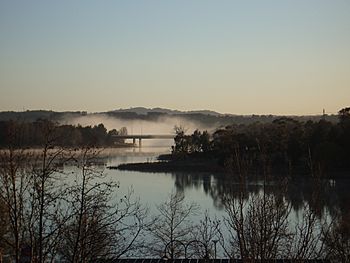Ginninderra Creek facts for kids
Quick facts for kids Ginninderra Creek |
|
|---|---|

Ginninderra Creek, impounded at Lake Ginninderra, 2011
|
|
| Other name(s) | Ginninderry Creek, Ginninginninderry Creek, Gingininderra Creek |
| Country | Australia |
| State/Territory | |
| IBRA | South Eastern Highlands |
| District | Capital Country |
| Town centres |
|
| Physical characteristics | |
| Main source | Spring Range north-east of Hall, ACT 599 m (1,965 ft) |
| River mouth | confluence with Murrumbidgee River Ginninderra Gorge, Yass Valley, NSW 430 m (1,410 ft) |
| Length | 23 km (14 mi) |
| Basin features | |
| River system | Murrumbidgee River, Murray–Darling basin |
| Reservoirs | Gungahlin Pond, Lake Ginninderra |
Ginninderra Creek is a stream in Australia. It flows through parts of the Australian Capital Territory (ACT) and New South Wales. This creek is part of the larger Murrumbidgee River system, which then flows into the Murray–Darling basin.
The name Ginninderra comes from an Aboriginal word. It means "sparkling" or "throwing little rays of light." The Aboriginal people of the Ngunnawal tribe are the traditional owners of the land around Ginninderra Creek.
Contents
The Creek's Journey
Ginninderra Creek starts in the Spring Range. This area is located north-east of Hall. The creek begins near the border between the ACT and New South Wales.
Flowing Through Canberra
The creek flows generally towards the south-west. It passes through the Ginninderra Plain. It also goes through the Gungahlin and Belconnen areas of Canberra. After this, it heads west and crosses back into New South Wales.
Meeting the Murrumbidgee
Finally, Ginninderra Creek joins the Murrumbidgee River. This meeting point is in the Ginninderra Gorge. The creek drops about 168 metres (551 ft) (551 feet) along its 23 kilometres (14 mi) (14 mi) path.
Man-Made Lakes and Waterfalls
Along its way, Ginninderra Creek flows into Gungahlin Pond. It also flows into Lake Ginninderra. Lake Ginninderra is a man-made lake built in 1974. It helps to catch dirt and pollution from the water. The creek also flows over the beautiful Ginninderra Falls. Here, the water drops about 41 metres (135 ft) (135 feet) before continuing through Ginninderra Gorge.
Water Quality and Environment
The area that collects water for Ginninderra Creek is about 32,000 hectares (79,000 acres) (79,000 acres). About a quarter of Canberra's city runoff flows into this creek. This means that water from streets and homes can carry pollution. There is a risk that this runoff could harm the plants and animals living in the Murrumbidgee River system.
Fun and Nature at Ginninderra Falls
Ginninderra Falls used to be a very popular place for tourists. It was open as a private park in the late 1990s. Many people loved visiting this scenic spot.
A Capital Idea
A journalist named John Gale thought Ginninderra Falls was so beautiful. He even argued that Canberra should be Australia's capital city. He believed it was a better choice than another proposed location called Dalgety.
Protecting the Falls
Since 2011, people have been working to create a national park around Ginninderra Falls. This park would cover about 900 hectares (2,200 acres) (2,200 acres). It would include land in both the ACT and New South Wales. Part of this proposed park is already a protected area called Woodstock Nature Reserve.
 | Lonnie Johnson |
 | Granville Woods |
 | Lewis Howard Latimer |
 | James West |

